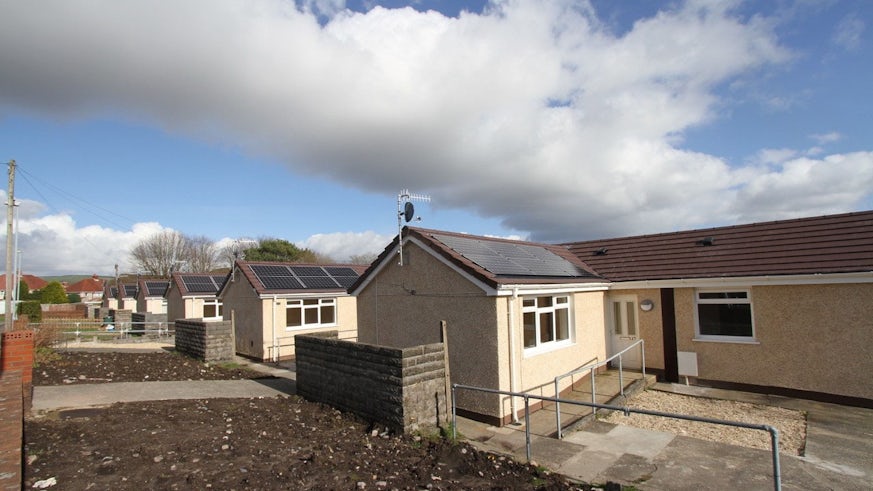Welsh School of Architecture supports low-carbon refit of Swansea bungalows
5 March 2020

Welsh School of Architecture staff who are members of the Low Carbon Built Environment project team have recently been working with Swansea Council on a comprehensive energy refurbishment of a row of bungalows in the Swansea valley.
The 50-year-old two-bed bungalows near Swansea used to heat their homes with oil, LPG and electric heaters which was very expensive. The bungalows have now been transformed with low carbon solutions including solar panels integrated into the roof to generate electricity which is stored in a Tesla battery, double glazed windows, insulated walls and roof and low energy lights. Water from 55 metres below the ground, via a ground source heat pumps provides heat for the homes and hot water. A ventilation system circulates filtered air throughout the building via ceiling vents, which helps retain the building's heat.
The LCBE team have worked very closely with the occupants, Swansea Council and the companies supplying and installing the technologies to ensure that the most appropriate options are chosen. They have used computer models to investigate different combinations of solutions to choose the most affordable with the biggest energy and cost savings that work with this type of home.
Swansea Council, the Welsh Government and the Welsh School of Architecture have funded the project with each bungalow costing around £55,000 to complete. The residents will be paying minimal energy bills from now on.
The Low Carbon Built Environment (LCBE) project which is based at the Welsh School of Architecture, Cardiff University, brings Welsh academics and industry together to reduce carbon dioxide emissions associated with the built environment. The projects undertaken by the team aim to provide evidence that it is possible to combine market available technologies to minimise the amount of energy used in affordable and replicable buildings that are comfortable and practical to live and work in. The team is made up of a number of academic staff from the Welsh School of Architecture including: Dr Jo Patterson, Huw Jenkins, Manos Perisoglou, Dr Xiaojun Li, Dr Ester Coma-Bassas, Dr Shan Shan Hou and Miltos Ionas.
Jo Patterson, Project Lead for the LCBE said: “We have been able to monitor the homes before and after the work has been carried out. This has allowed us to really measure the effect that improving the homes has on the lives of the people living in them. We can tell how much warmer the homes are, how much energy they are saving and as a result of this what the impact will be on climate change”.
The LCBE team designed and funded some of the elements of the Fford Ellen project and now, backed by the Welsh European Funding Office Grant plus match funding, are working on similar projects across Wales.
For latest news from the LCBE project please follow their Twitter account.
The LCBE project is part of SPECIFIC Innovation and Knowledge Centre, which is led by Swansea University and part-funded by the European Regional Development Fund through the Welsh Government, InnovateUK and EPSRC.
